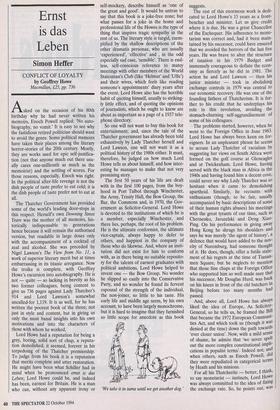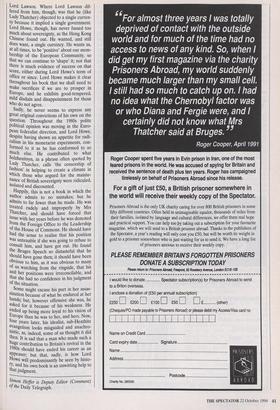Ernst is das Leben
Simon Helfer
CONFLICT OF LOYALTY by Geoffrey Howe Macmillan, f25, pp. 736
Asked on the occasion of his 80th birthday why he had never written his memoirs, Enoch Powell replied: 'No auto- biography, no vomit.' It is easy to see why the fastidious retired politician should want to avoid the genre. Some political memoirs have taken their places among the literary horror-stories of the 20th century. Mostly, they are works used for epic self-justifica- tion (not that anyone much out there usu- ally cares one-millionth as much as the memoirist) and the settling of scores. For those reasons, especially, Enoch was right. In the political after-life revenge is not the dish people of taste prefer to eat cold; it is the dish people of taste prefer not to eat at all.
The Thatcher Government has provided some of the world's leading door-stops in this respect. Herself's own Downing Street Years was the mother of all memoirs, his- torically indispensable to generations hence because it will remain the authorised version, but readable in large doses only with the accompaniment of a cocktail of zeal and alcohol. She was preceded by Nigel Lawson's The View from No. 11, a work of superior literary merit but at times embarrassing in its titanic arrogance. Now the troika is complete, with Geoffrey Howe's excursion into autobiography. He is not — quite — so lacking in brevity as his two former colleagues, being content to give us 736 pages against Lady Thatcher's 914 and Lord Lawson's somewhat uncalled-for 1,119. It is as well, for he has written the poorest book of the three; not just in style and content, but in giving us only the most banal insights into his own motivations and into the characters of those with whom he worked.
Lord Howe had a reputation for being a grey, boring, solid sort of chap, a reputa- tion demolished, it seemed, forever in his torpedoing of the Thatcher premiership. To judge from his book it is a reputation that merits complete and utter restoration. He might have been what Schiller had in mind when he pronounced emst is das Leben; Lord Howe could be, and indeed has been, earnest for Britain. He is a man who can, without any apparent irony or self-mockery, describe himself as 'one of the great and good'. It would be untrue to say that this book is a joke-free zone; but what passes for a joke in the home and professional life of the Howes is the type of thing that inspires tragic sympathy in the rest of us. The literary style is turgid, exem- plified by the shallow descriptions of the other dramatis personae, who are usually `experienced', 'effective' and , in the odd especially sad case, 'sensible'. There is end- less, self-conscious reference to matey meetings with other members of the World Statesman's Club (like 'Helmut' and `Uffe') and their wives, which feels like reading someone's appointments' diary years after the event. Lord Howe also has the horrible habit of quoting himself, usually to striking- ly little effect, and of quoting the opinions of journalists, which he ought to know are about as important as a page of a 1937 tele- phone directory.
So one will not want to buy this book for entertainment; and, since the tale of the Thatcher government has already been told exhaustively by Lady Thatcher herself and Lord Lawson, one will not want it as a political history of the 1980s either. It must, therefore, be judged on how much Lord Howe tells us about himself, and how inter- esting he manages to make that not very promising story.
The first 50 years of his 'life are dealt with in the first 100 pages, from the boy- hood in Port Talbot through Winchester, the Army, Trinity Hall, the Bow Group, the Bar, the Commons and, in 1970, the Gov- ernment as Solicitor-General. Lord Howe is devoted to the institutions of which he is a member, especially Winchester, and there lies, perhaps, the root of his problem. He is the ultimate conformist, the ultimate vice-captain, always happy to defer to others, and happiest in the company of those who do likewise. And, where an insti- tution did not exist for him to conform with, as in there being no suitable reposito- ry for the talents of earnest graduates with political ambitions, Lord Howe helped to invent one — the Bow Group. No wonder he slipped so easily into the Conservative Party, and no wonder he found its fervent espousal of the strength of the individual, the non-joiner, so little to his taste. His early life and middle age seem, by his own account, to have been largely monochrome, but it is hard to imagine that they furnished so little scope for anecdote as this book 'We take it in turns until we get another dog.' suggests.
The rest of this enormous work is dedi- cated to Lord Howe's 15 years as a front- bencher and minister. Let us give credit where it is due. He was a great Chancellor of the Exchequer. His adherence to mone- tarism was correct and, had it been main- tained by his successor, could have ensured that we avoided the horrors of the last five years. He was brave to alter the structure of taxation in his 1979 Budget and immensely courageous to deflate the econ- omy as fiercely as he did in 1981. The action he and Lord Lawson — then his junior minister — took in abolishing exchange controls in 1979 was central to our economic recovery. He was one of the founding fathers of Thatcherism. It is fur- ther to his credit that he underplays his role in this revolution, avoiding the stomach-churning self-aggrandisement of some of his colleagues.
The problems started, however, when he went to the Foreign Office in June 1983. Lord Howe has always been keen on for- eigners. In an unpleasant phrase he seems to accuse Lady Thatcher of racialism by suggesting her views on South Africa were formed on the golf course at Gleneagles and at Twickenham. Lord Howe, having served with the black man in Africa in the 1940s and having found him a decent cove, could never see why Lady Thatcher was so hesitant when it came to demolishing apartheid. Similarly, he recounts with enthusiasm (though, to be fair, usually accompanied by basic descriptions of some of their human rights abuses) his meetings with the great tyrants of our time, such as Chernenko, Jaruzelski and Deng Xiao- Ping. On his performance in giving away Hong Kong he shrugs his shoulders and says he was merely 'the agent of history', a defence that would have added to the nov- elty of Nuremburg, had someone thought of it. He does, though, offer a futile state- ment of his regrets at the time of Tianan- men Square, but he neglects to mention that those fine chaps at the Foreign Office who supported him so well made sure that his successor, Mr Douglas Hurd, was back on his knees in front of the old butchers in Beijing before too many months had passed.
And, above all, Lord Howe has always liked the idea of Europe, As Solicitor- General, so he tells us, he framed the Bill that became the 1972 European Communi- ties Act, and which took us (though it was denied at the time) down the path towards `ever closer union'. Now, with a mild sense of shame, he admits that 'we never spelt out the more complex constitutional impli- cations in populist terms'. Indeed not; and when others, such as Enoch Powell, did they were repudiated in categorical terms by Heath and his minions. For all his Thatcherite — better, I think, to say monetarist — instincts, Lord Howe was always committed to the idea of fixing the exchange rate. So, he points out, was Lord Lawson. Where Lord Lawson dif- fered from him, though, was that he (like Lady Thatcher) objected to a single curren- cy because it implied a single government. Lord Howe, though, has never fussed too much about sovereignty, as the Hong Kong Chinese found out. He wanted, and still does want, a single currency. He wants us, at all times, to be 'positive' about our mem- bership of the European Community, so that we can continue to 'shape' it; not that there is much evidence of success on that score, either during Lord Howe's term of office or since. Lord Howe makes it clear throughout his book that we shall need to make sacrifices if we are to prosper in Europe, and he exhibits good-tempered, mild disdain and disappointment for those who do not agree. Sadly, he never seems to express any great original convictions of his own on the question. Throughout the 1980s polite political opinion was moving in the Euro- pean federalist direction, and Lord Howe, despite having shown an appetite for radi- calism in his monetarist experiments, con- formed to it as he has conformed to so much else. He contributed to what Solzhenitsyn, in a phrase often quoted by Lady Thatcher, calls 'the censorship of fashion' in helping to create a climate in Which those who argued for the mainte- nance of British sovereignty were ridiculed, isolated and discounted.
Happily, this is not a book in which the author admits to no mistakes; but he admits to far fewer than he made. He was treated rudely and improperly by Mrs Thatcher, and should have forced that issue with her years before he was demoted from the Foreign Office to the Leadership of the House of Commons. He should have had the sense to realise that his position was untenable if she was going to refuse to consult him, and have got out. He found the Bruges Speech so distasteful that he should have gone then; it should have been obvious to him, as it was obvious to many of us watching from the ringside, that his and her positions were irreconcilable, and that she had no confidence in his judgment of the situation.
Some might excuse his part in her assas- sination because of what he endured at her hands; but, however offensive she was, he asked for it because of his weakness. He ended up being more loyal to his vision of Europe than he was to her, and hers. Now, four years later, his idealist, sub-Heathite evangelism looks misguided and anachro- nistic, as, indeed, some of us thought it did then. It is sad that a man who made such a huge contribution to Britain's revival in the 1980s should have ended his career as an appeaser; but that, sadly, is how Lord Howe will predominantly be seen by histo- ry, and his own book is an unwitting help to that judgment.
Simon Heffer is Deputy Editor (Comment) of the Daily Telegraph.











































































 Previous page
Previous page